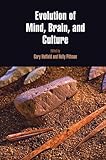Evolution of Mind, Brain, and Culture / ed. by Holly Pittman, Gary Hatfield.
Material type: TextPublisher: Philadelphia : University of Pennsylvania Press, [2013]Copyright date: ©2013Description: 1 online resource (496 p.) : 27 illusContent type:
TextPublisher: Philadelphia : University of Pennsylvania Press, [2013]Copyright date: ©2013Description: 1 online resource (496 p.) : 27 illusContent type: - 9781934536490
- 9781934536605
- 155.7 23
- online - DeGruyter
- Issued also in print.
| Item type | Current library | Call number | URL | Status | Notes | Barcode | |
|---|---|---|---|---|---|---|---|
 eBook
eBook
|
Biblioteca "Angelicum" Pont. Univ. S.Tommaso d'Aquino Nuvola online | online - DeGruyter (Browse shelf(Opens below)) | Online access | Not for loan (Accesso limitato) | Accesso per gli utenti autorizzati / Access for authorized users | (dgr)9781934536605 |
Frontmatter -- Contents -- Figures -- Tables -- Contributors -- Penn Museum International Research Conferences. Foreword -- Preface -- 1 Introduction: The Evolution of Mind, Brain, and Culture -- 2. When Did We Become Human? Evolutionary Perspectives on the Emergence of the Modern Human Mind, Brain, and Culture -- 3. What Genetics Can Tell Us about the Origins of the Modern Human Brain -- 4. The Primate Mind before Tools, Language, and Culture -- 5. Functions of Premotor Cortices: From Motor Control to Social Cognition -- 6. The Origins of Human Cooperation from a Developmental and Comparative Perspective -- 7. Mimesis Theory Re-Examined, Twenty Years after the Fact -- 8. The Role of Cooperation in the Evolution of Protolanguage and Language -- 9. The Cathedral Model for the Evolution of Human Cognition -- 10. Cognition, Behavioral Modernity, and the Archaeological Record of the Middle and Early Upper Paleolithic -- 11. Rethinking Paleoanthropology: A World Queerer Than We Supposed -- 12. Human Behavioral Ecology, Optimality, and Human Action -- 13. The Distinctively Human Mind: The Many Pillars of Cumulative Culture -- 14. Human Culture Is More than Memes and Transmission -- References Cited -- Index
restricted access online access with authorization star
http://purl.org/coar/access_right/c_16ec
Descartes boldly claimed: "I think, therefore I am." But one might well ask: Why do we think? How? When and why did our human ancestors develop language and culture? In other words, what makes the human mind human?Evolution of Mind, Brain, and Culture offers a comprehensive and scientific investigation of these perennial questions. Fourteen essays bring together the work of archaeologists, cultural and physical anthropologists, psychologists, philosophers, geneticists, a neuroscientist, and an environmental scientist to explore the evolution of the human mind, the brain, and the human capacity for culture. The volume represents and critically engages major theoretical approaches, including Donald's stage theory, Mithen's cathedral model, Tomasello's joint intentionality, and Boyd and Richerson's modeling of the evolution of culture in relation to climate change.No recent publication combines this breadth of evidential and theoretical perspective. The essays range in topic from the macroscopic (the evolution of social cooperation) to the microscopic (examining genetic data to infer evolutions in brain structure and function), and from the ancient (paleoanthropological reconstructions of hominin cognitive abilities) to the modern (including modern hominin's similarities to our primate cousins). Considered together, these essays constitute a fascinating, detailed look at what makes us human.PMIRC, volume 5
Issued also in print.
Mode of access: Internet via World Wide Web.
In English.
Description based on online resource; title from PDF title page (publisher's Web site, viewed 24. Apr 2022)


